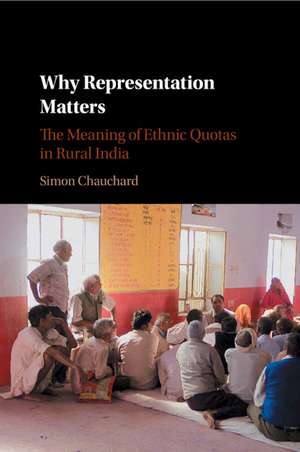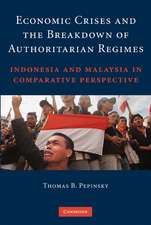Why Representation Matters: The Meaning of Ethnic Quotas in Rural India
Autor Simon Chaucharden Limba Engleză Paperback – 16 ian 2019
| Toate formatele și edițiile | Preț | Express |
|---|---|---|
| Paperback (1) | 288.04 lei 6-8 săpt. | |
| Cambridge University Press – 16 ian 2019 | 288.04 lei 6-8 săpt. | |
| Hardback (1) | 519.48 lei 6-8 săpt. | |
| Cambridge University Press – 15 feb 2017 | 519.48 lei 6-8 săpt. |
Preț: 288.04 lei
Nou
Puncte Express: 432
Preț estimativ în valută:
55.11€ • 57.85$ • 45.75£
55.11€ • 57.85$ • 45.75£
Carte tipărită la comandă
Livrare economică 11-25 aprilie
Preluare comenzi: 021 569.72.76
Specificații
ISBN-13: 9781107565807
ISBN-10: 1107565804
Pagini: 308
Ilustrații: 22 b/w illus. 1 map 28 tables
Dimensiuni: 152 x 230 x 18 mm
Greutate: 0.46 kg
Editura: Cambridge University Press
Colecția Cambridge University Press
Locul publicării:New York, United States
ISBN-10: 1107565804
Pagini: 308
Ilustrații: 22 b/w illus. 1 map 28 tables
Dimensiuni: 152 x 230 x 18 mm
Greutate: 0.46 kg
Editura: Cambridge University Press
Colecția Cambridge University Press
Locul publicării:New York, United States
Cuprins
List of figures; List of tables; Acknowledgments; Note on terminology; 1. Political representation and intergroup relations; 2. Untouchability in rural India: persistence and evolution; 3. Local representation in rural India: a view from the ground; 4. Theory: the impact of descriptive representation; 5. Quantitative methodology; 6. The material and tangible effects of descriptive representation; 7. The cognitive impact of descriptive representation; 8. The effects of descriptive representation on interpersonal relations; 9. Descriptive representation and intergroup relations in comparative perspective; Appendix A. Methodical note on field research; Appendix B. The pair-matches; Appendix C. Additional balance tests; Appendix D. Did members of the scheduled castes self-select into reserved villages?; Bibliography; Index.
Recenzii
'Chauchard's study is yet an important one that pursues its objectives rigorously. This is certainly reflected in his exhaustive discussion on terminology and his review on the domain of reservations … Chauchard's study is undoubtedly one that cannot be ignored by scholars and students of political systems. Even general readers will be enriched in terms of understanding the dynamics between values and prejudices of people, social policy and its implementation and social research.' Chandni Girija, Aigne
Notă biografică
Descriere
This book explores how political quotas mandating inclusion of marginalized groups socially impact the intergroup relations.















